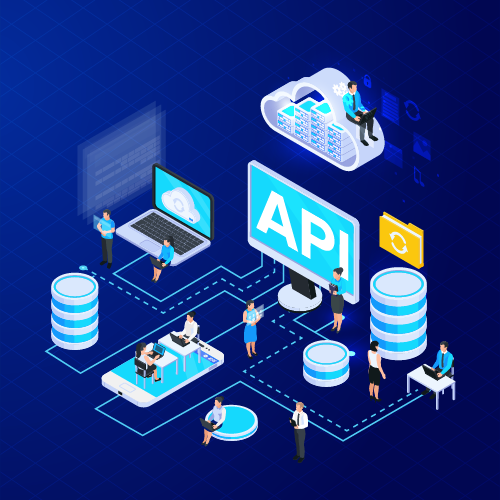The success of any firm, regardless of size, is increasingly dependent on APIs. The usage of this technology is making businesses more aware of how competitive they are. The API benefits for business are so greater and
Retailers want to learn more about their clients in this new digital age so they can better cater their offerings to their demands. The secret to retaining and attracting customers is personalization. It makes sense to investigate the advantages of APIs for companies for this reason.
By offering services that truly meet the demands of their users, organisations can employ a variety of methods to create more scalable platforms. Through an API, it is simple to integrate these technologies.
Developers don’t typically start from zero when writing code in the real world. The best API development platform allows programmers to write codes and software while utilising pre-existing frameworks. They may now concentrate on developing the appealing proposition of the web and apps.
To use existing infrastructure, APIs provide standardised methods for doing so. They can be compared to electric gadgets in that they can be plugged into an existing network without the requirement for a generator. In essence, that’s how a developer uses an API to link their websites and applications to current technologies.
The advantages that an API platform can provide to any organisation will be discussed in this article.
Understanding an API
Application Programming Interface is known as an API. It is a piece of software that connects two different programmes.
APIs enable certain databases to be accessed by websites and apps, allowing for customised interactions. On GitHub, there are currently over 2 million API projects, while ProgrammableWeb has about 24,000 registered APIs.
To demonstrate how they operate, let’s take an example: The typical procedures for purchasing movie tickets online include picking the movie and inputting the payment card information, and that’s it. A subsequent date may see the production of tickets.
Between those stages, however, there are APIs that, for instance, connect the website with the bank. Simply said, they involve some kind of collaboration with another program that happens in the background.
In general, APIs are in charge of sending a user’s response to a system and then returning the system’s response to the user, allowing various applications to communicate with one another.
6 Benefits of API Platforms for Business
Any organisation can gain from using APIs in a variety of ways that support engagement and growth through scalable solutions. APIs may be the best option for a business searching for cutting-edge tools to enhance client experiences and cut costs. Business processes can be made more productive by using APIs.
Let’s examine a few advantages of using API development platforms:
- Encourages Innovation
The implementation of APIs will benefit businesses as the need for modern software increases. Investing in innovation and technology by a company nowadays is more important than ever.
88% of clients anticipate businesses to quicken their digital endeavours as a result of the Covid-19 pandemic. Although there are many different ways that APIs can foster innovation, one of the most important ways is by enabling programmers to quickly access data and features from other applications, which can lead to significant improvements and new functionality. Developers can use APIs to improve the functionality of their current systems and benefit from data sources.
- Increase Automation
Because they are essential for automating a website’s or app’s processes, APIs are important in terms of development agility. Previously manual processes are now made simple through the usage of networked applications and API interfaces.
A digital business can be built faster and with fewer effort thanks to APIs.
- Improvement of Customization
Generally speaking, APIs enhance customisation by enabling developers to access and utilise data and functionality from other apps.
The content of the website or app can then be modified by the developers to better suit the requirements of users and visitors, enhancing the flexibility and personalization of the user experience.
In a survey, 52% of customers said they expected offerings to constantly be individualised, and 66% said they expected businesses to recognise their particular wants and needs.
- Constructs New Forms of Income
While expanding their services and addressing client requirements, APIs can also help businesses generate additional revenue.
A company can enable their consumers to make purchases within their websites or apps and earn money from the commissions by growing business growth via payment APIs (for example, integrating a gift card reseller API). Without a doubt, APIs give digital businesses the ability to adopt new business models and generate new revenue streams from their digital assets.
- Enhances the Customer Experience
With the use of APIs, companies may quickly provide a range of services. Developers now can create experiences that live up to client expectations, opening up countless opportunities.
Accessing the data or services that clients require can be made simpler by integrating an API. The customer experience can be further enhanced by a well-designed API that helps to cut down on the steps needed to perform a task.
- Saves Money
The opportunity to cut costs is one of the major advantages of APIs for businesses. The majority of the time, it is not cost-effective to build an app from scratch because it involves many development fees.
Developers don’t have to design apps from the ground up when they use APIs because they may obtain the majority of the software features they require. Therefore, the development team may concentrate on other objectives while saving time, effort, and money.
Conclusion:
Businesses are searching for novel ways to engage with clients in the current digital age as consumers demand more excellent offerings. Because of this, the idea of integrating an API to accomplish this purpose is rapidly rising in importance inside the organisation.
No code API platform can create and link the APIs that consumers and businesses require to create custom solutions. For organisations that might not have the resources or the know-how to set up their business procedures and systems, this is a big help. However, it also carries security-related dangers. Therefore, it becomes sensible to think about utilising systems that have security as standard functionality.











